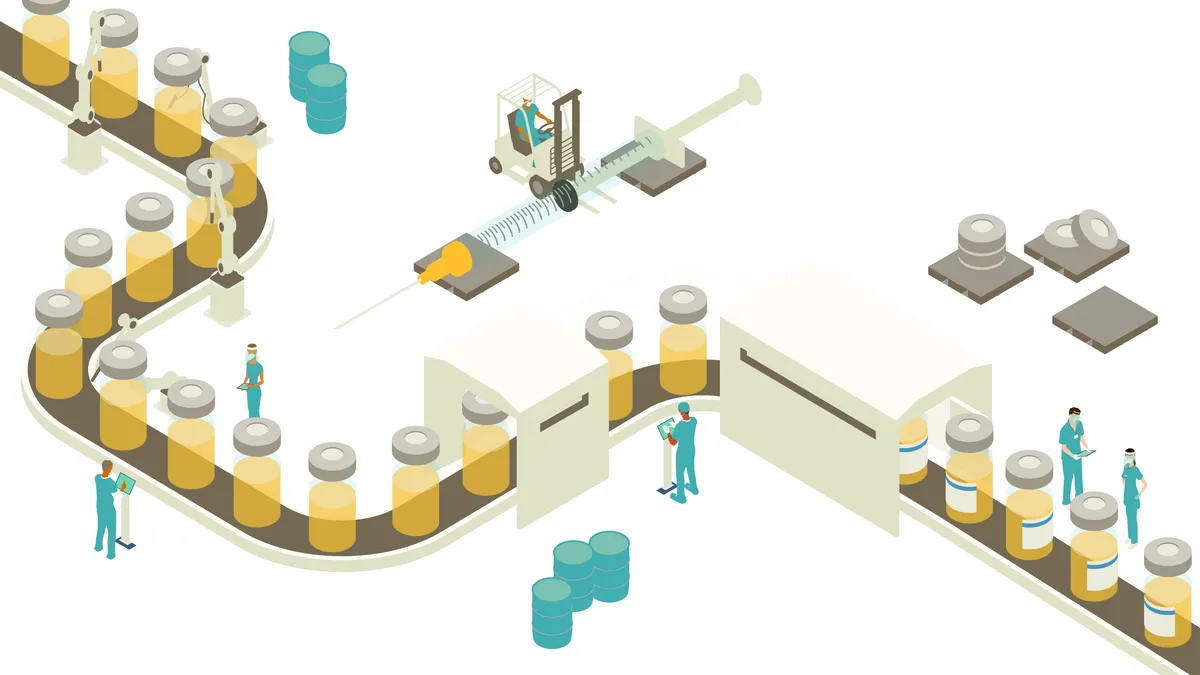For the first time, the CDC’s Advisory Committee on Immunization Practices (ACIP) is recommending enhanced influenza vaccines for older Americans. In a unanimous vote late last month ACIP recommended that people aged 65 and older get one of three enhanced flu vaccines, rather than the standard dose, including Fluad Quadrivalent, manufactured by the company Seqirus.
Fluad Quadrivalent includes a MF59 adjuvant, a substance that helps boost the body’s immune response, in addition to the same amount of antigen as other standard dose inactivated flu vaccines. The other vaccines included in this preferential recommendation are the higher-dose vaccines Fluzone High-Dose Quadrivalent and Flublok Quadrivalent, both manufactured by Sanofi.
Fluad is the only adjuvant-based vaccine in the U.S. market, says Dave Ross, vice president of commercial operations in North America for Seqirus, which specializes exclusively on influenza vaccine technologies. While these enhanced flu vaccines have been available for several years, Ross says that 20% to 25% of over 65-year-olds are still getting the standard dose vaccine.
“Up until now, the recommendation was for them to get any of the approved vaccines for that population,” Ross says. “While there has been a significant move over the last few years for clinicians and patients to move toward an enhanced vaccine like Fluad, there was an absence of a recommendation.”
That’s now changed.
“It's very clear guidance for healthcare providers and patients alike on the importance not only of immunization, but for them to get a product that's designed to address that unique kind of weakened immune system of the 65 and older,” says Ross.
PharmaVoice talked with Ross about the significance of this new recommendation and how it fits into the larger discussion about vaccines and vaccine technology.
This conversation has been edited for length and clarity.
PharmaVoice: You called this a milestone vote. Why is that?
Dave Ross: If you look at the last 20 years, there have been a number of decisions that have moved flu protection forward.
[One is] the universal age recommendation. At one point there were condition-based recommendations, and they were simplified to be age-based. And when that happened, immunization rates grew tremendously.
Another milestone, in my opinion, is when the market moved from a trivalent vaccine to a quadrivalent [which includes two influenza B antigens instead of just one], offering one more strain of protection.
"We focus exclusively on flu because it’s a complicated virus. And we feel that by being 100% focused on flu, it allows us not only to address the existing vaccines, but to also innovate for the future."

David Ross
Seqirus' vice president of commercial operations in North America
I would put this up there with those types of decisions by the Advisory Committee in favor of universal age-based recommendations. [It] advances that standard of care for that 65-plus population who suffers the highest rates of morbidity and mortality from influenza.
How does this guidance fit into the bigger vaccine discussion?
It fits in very well with the discussion that circulates around COVID-19 vaccines, as an example. Over the last two years there's been such an education of the public around the importance of the technology platforms that are utilized to make vaccines. There's been a lot of discussion and awareness that has grown around the value of innovations like mRNA technology. And it allows for a space for discussions around technology advances and other vaccine platforms like flu.
There are a lot of different things that are happening in the flu space. Yes, historically, the vaccines have been manufactured on an egg platform for many decades. But if we look at our platform in particular, we're uniquely positioned within the marketplace.
We’re a vaccine company that's exclusively focused on influenza vaccines. When Seqirus was formed back in 2015 we did so with the intent of being a specialty supplier of influenza vaccines, and we utilize innovative technologies like the adjuvants to enhance the vaccines.
In the case of Flucelvax, which is another product that we manufacture for those under 65, it's a non-egg platform. It's all cell-based manufacturing. And that product is specifically designed to remove the risk of what's referred to as egg adaptation, which could lead to lower vaccine effectiveness in a particular year.
So, this discussion around COVID and the technologies that have been used [for vaccines] have helped people understand that not all vaccine technologies are the same. It creates the space to have more engaging conversations not only with clinicians, but I think with the general public, about differentiated products like Fluad and like Flucelvax.
Why is Seqirus exclusively focused on influenza?
We focus exclusively on flu because it's a complicated virus. And we feel that by being 100% focused on flu, it allows us not only to address the existing vaccines, but to also innovate for the future.
As we look to the future, we have our sights on two other technology platforms to further advance the standard of care. The first one is basically a combination of our cell technology and adjuvant technology. So, we get the boosting qualities of the adjuvant, and we get the cell technology which eliminates egg adaption. And those two technologies coming together, we believe, has the potential of being a new standard of care.
We're also looking at self-amplifying (sa) messenger mRNA, which is essentially what we believe to be the next generation of mRNA technology focused on flu. By being 100% focused on flu at this point, it allows us to continue to innovate not only on existing platforms, but also on future platforms as well.
On the adjuvant and cell technology, we're in clinical trials now and we're expecting to launch that product within the next five years. And on the sa-mRNA we’re in early-stage development of the vaccine. We're looking a little bit beyond the middle of the next decade.
Why is it still important to focus on flu vaccinations even during the COVID-19 vaccine push?
We're all focused very much on COVID and immunization, as we should be. It’s very important that we immunize as many people as possible. But influenza is a devastating disease in and of itself. During any year, 10,000- 50,000 people in the U.S. die from influenza, and there are hundreds of thousands of hospitalizations that are possible.
Flu is serious. Immunization is the best way to protect yourself against flu. And it’s important that we immunize as many people as possible not only to protect against flu, but as a tool in the COVID-19 battle because it helps preserve health system capacity. COVID-19 is still an unknown element and we're not sure what the disease activity for COVID-19 will be in the coming winter, so let’s minimize flu as much as possible.

















